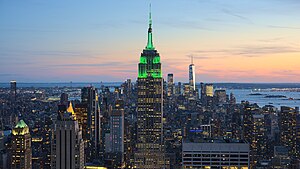Wikipedia:Requests for comment/Media, the arts, and architecture
The following discussions are requested to have community-wide attention:
| Which lead image is clearer? Castncoot (talk) 19:38, 22 April 2024 (UTC) |
|
| Should we refer to Julian Assange as a journalist?
Wikinetman (talk) 03:04, 6 April 2024 (UTC) |
Talk:2024 United States presidential election
| There is currently an edit dispute on whether Kennedy Jr. should appear in the infobox of states that will likely not receive polling in the 2024 presidential election or have not been polled yet.
Option #1: Kennedy Jr. should appear in the infobox of every state he has ballot access in. Option #2: If the aggregate state polling shows Kennedy Jr. under >5% or >10% (whatever is determined by the RFC): then he shouldn't be included. If no polling has been done or he is above 5-10%, then he should be included. Option #3: Kennedy Jr. should not appear in the infobox if polling of the state has not been performed. |
Talk:Francis Scott Key Bridge (Baltimore)
| The lead section first sentence says "The bridge was", in past tense. Should the first sentence be in past tense (Support past tense); or in present tense (Oppose past tense)? -- GreenC 19:24, 5 April 2024 (UTC) |
| Should the nationality in the lead section be represented as English or British? HorrorLover555 (talk) 15:56, 5 April 2024 (UTC) |
| Hi fellow editors. The conversation about changing Ariana's photo seems to be going nowhere. From what I can see, there doesn't seem to be any decisions being made but constant edit warring, so I thought starting an RFC would be the best course of action. There are so many images available so I am unsure why this has become a problem but hopefully this speeds things along. Comment below which photo you think the article should to change to and feel free to comment on why! Maxwell King123321 01:43, 4 April 2024 (UTC) |


